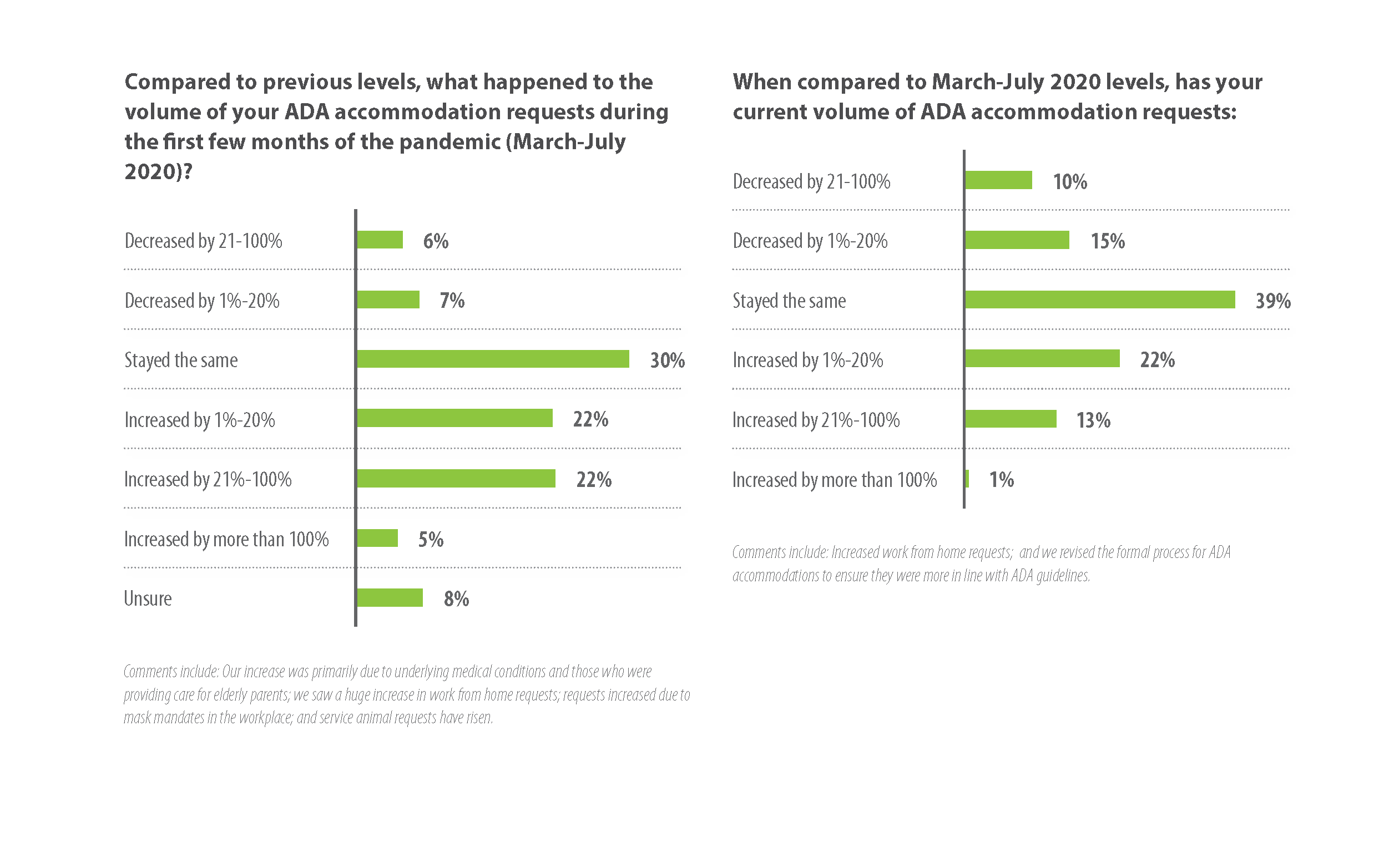Remote Work and Vaccine Mandates Are Driving an Increase in ADA Accommodation Requests. Why a Human-Centered Approach Is Vital
For more than three decades, leave management professionals have grappled with their obligations under the Americans with Disabilities Act (ADA), and COVID-19 has upped the ante.
Employers are receiving an increasing number of ADA accommodation requests, according to our latest DMEC ADA Accommodations Pulse Survey. They’re also juggling economic recovery issues and facing an increasingly difficult hiring market.
Industry experts say increased transparency, active two-way conversations and a more human-centered approach to management helps alleviate stress for employers, who report a spike in ADA accommodation requests as noted by our May 2021 survey respondents:
- 36% of whom reported more requests now compared with the early months of the pandemic; and a small percentage said requests increased by more than 100%.
- 53% of whom reported more “leave as an accommodation” requests; and a small percentage of employers reported an increase of more than 100%.
Practical Realities
ADA accommodation requests related to vaccines — as well as masking requirements and remote work — are expected to increase as a result of the new requirements announced by President Biden in September.
Prior to these mandates, employers were addressing an increase in requests in these ways:
- 22% of survey respondents added temporary staff,
- 21% paid existing staff overtime and
- 18% added permanent staff.
Under the ADA and other laws, employees can request exemptions from vaccination requirements for demonstrated medical or religious reasons, and there are a lot of questions about what’s allowable.
The ADA survey, which we plan to repeat in November, showed that the top three physical conditions for which employees requested ADA accommodations are COVID-related symptoms, migraines and musculoskeletal disorders.
As we brace for ongoing issues with the pandemic, I wonder how the Equal Employment Opportunity Commission will view accommodations for COVID-19 symptoms in the future.
Those with persistent and disabling medical or mental conditions prompted by COVID-19, sometimes called “long haulers” with “long COVID,” can request ADA accommodations. But will COVID-related symptoms continue to qualify for some form of accommodation?
And, if so, what does that mean for similar symptoms caused by other contagious viruses, such as influenza? We’ll have to wait to see just how far COVID-19 has opened the door for virus accommodations.
 Mental Health
Mental Health
Mental health accommodation requests might also herald a continuation and possible intensification of employer ADA challenges. The top three conditions that prompted requests, according to our survey were anxiety, depression and substance use disorders.
This data confirms what we have heard during the last 18 months. The pandemic prompted an increase in mental and behavioral health issues among nearly every sector of the U.S. population.
In fact, a third of Americans now show signs of clinical anxiety or depression, and depression is a leading cause of disability worldwide, according to Census Bureau data and the World Health Organization, respectively. And, not surprisingly, a growing number of employees say mental health issues directly affect their work and report signs of burnout.
There is one glimmer of hope among the pandemic gloom: more people are willing to talk openly about mental health. Younger workers acknowledge the need for assistance, seek help, and want employer assistance to help them find and cover the services through benefit plans.
In fact, younger generations of workers (59% of Millennials and 71% of Gen Z) are reporting mental health issues, according to a study from The Standard. These two generations — people born between 1981 and 2015 — seem to be more open about acknowledging and discussing mental health issues. But how will employers support and accommodate them?
More employers are talking about expanding employee assistance programs and other benefits with mental health support, encouraging employees to create supportive workgroups, and publishing resources to ensure employees have the resources they need to lead balanced lives and feel confident in their abilities at work.
Training
Taking a more human-centered approach extends to training, an essential part of successful risk management associated with ADA accommodation requests. Failure to adequately train staff members can come with a hefty price tag and take a toll on your team.
Now more than ever, disability compliance teams need trustworthy tools and resources to manage this risk and to maximize performance and competitive positioning.
Risks imposed by the pandemic, government regulations, and global supply chain difficulties may be outside the control of any single company; but legal liability for failure to comply with laws and regulations is not.
And as you adjust to new workplace practices and work-from-home realities, it will be increasingly important to ensure those individuals who manage ADA have the information, training, and support they need to make ADA-compliant decisions.
We thought we would be rounding the corner on the pandemic and vaccines as we moved into the latter half of the year; but unfortunately as the virus mutates and as individuals contest vaccines, managing the ADA accommodation process has gotten exponentially more difficult.
As we look forward, it is encouraging to hear industry experts talk about taking a more human-centered approach to management.
One thing we have all seen during this pandemic is the value of connections and the power of community. &








